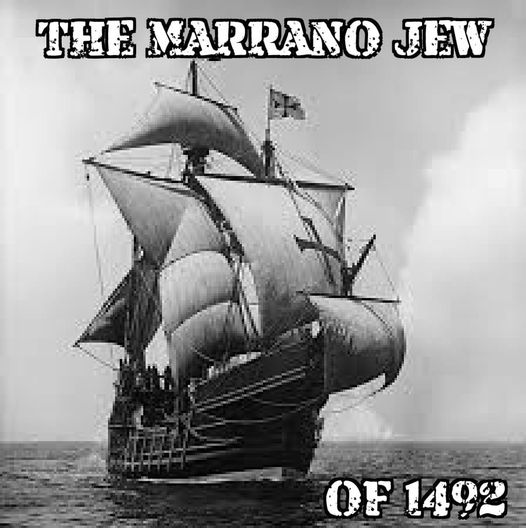Christopher Columbus the Jew
CECIL ROTH’S HISTORY OF THE MARRANOS
The connection between the Jews and the discovery of America was not, however, merely a question of fortuitous coincidence.
The epoch-making expedition of 1492 was as a matter of fact very largely a Jewish, or rather a Marrano, enterprise.

The Jews were the original Pirates of the seas
COLUMBUS, THE JEW?
A few scholars, including Roth, present strong evidence that Columbus was himself a Jew.
He hid his Jewishness, they say, because “no Spanish Jew could ever have expected aid
from the king and queen of Spain, so the explorer claimed to be an Italian Catholic.”
Tina Levitan, author of Jews in American Life, found the first reference to Columbus’ Jewishness in print in a diplomatic document dated fifty-eight years after the discoverer’s death.
The French ambassador to Spain, she reveals, refers to “Columbus the Jew.”
Furthermore she states:
“From him we learn that Cristobal Colon (who never called himself Christopher Columbus and never spoke or wrote Italian) was the son of Susanna Fontanarossa [also spelled Fonterosal and Domingo Colon of Pontevedra, Spain, where those bearing such surnames were Jews, some of whom had been brought before the Spanish Inquisition …. Letters written by him to strangers have the custom-ary X at the top to indicate the faith of the writer, but of the thirteen letters written to his son only one bears an X, and that letter was meant to be shown to the King of Spain.
The others have in the place of the X a sign that looks like the Hebrew characters B and H, initials used by religious Jews meaning in Hebrew, “With the Help of God.”
Harry L. Golden and Martin Rywell, authors of Jews in American History:
Their Contribution to the United States of America, are quite insistent about the Jewishness of Columbus. They cite where Ferdinand, Columbus’ son, writes that his father’s “progenitors were of the blood royal of Jerusalem…”
In Columbus’ words, “for when all is done, David, that most prudent king was first a shepherd and afterwards chosen King of Jerusalem, and I am a servant of that same Lord who raised him to such a dignity.”
One Jewish author insists that “all existing portraits of the discoverer gave him a Jewish cast of countenance.”
Another claimed that a “certain softheartedness in Columbus is a Jewish trait.”
His lineage also pointed to Jewish roots – his mother’s maiden name was Suzanna Fonterosa, “daughter of Jacob, granddaughter of Abraham and a Jewess.
His father, Domingo Colon, was a map-seller. Did not Columbus write the King of Spain that his ancestors were interested in maps?
COLUMBUS, THE SLAVE DEALING JEW?
Christopher Columbus was an experienced sailor long before his infamous voyage
>west. Sir Arthur Helps writes that, “In the course of [his] letters, [Columbus] speaks after the fashion of a practised slave dealer.”
In fact, in 1498, his five ship expedition brought 600 Indians to Spain as slaves. Two hundred were given to the masters of the ships and four hundred sold in Spain. Columbus employed slave labor in gold mining even before sailing for the New World.
He helped to start the Portuguese West African settlement of San Jorge El Mina
(St. George of the Mines) in present-day Ghana, formerly known as the Gold Coast.
When the Spaniards found gold in the New World, reports Eric Rosenthal in his book, Gold! Gold! Gold!: The Johannesburg Gold Rush, they started on a gold hunt of such intensity that the natives came to believe the white men suffered from some disease curable only by the limitless application of this metal…
[When] Columbus discovered that, apart from some poor alluvial deposits, the gold simply did not exist, he forced the harmless Indian
aborigines into slavery… The entire importation of gold from the New World for the first 20 years after 1492 represented in cash only $300,000 a year, and the total then recovered, worth about $5 million, cost at least 1 1/2 million Indian lives.
Columbus was anything but a blessing to the New World population.
The Europeans, led by Columbus, brought unprecedented brutality to the West leaving the remains of whole communities of Red people in their wake.
On Hispaniola Columbus found gold and a docile Arawak population.
He lavished praise on the natives and gained their trust and affection and then proceeded to enslave them.
According to Columbus: “They are without arms, all naked, and without skill at arms and great cowards, a thousand running away from three, and thus they are good to be ordered about, to be made to work, plant, and do whatever is wanted, to build towns and be taught to go clothed and accept our customs.”
Cities began to spring up all over the island of Hispaniola. The traffic in slaves – African and Indian – grew rapidly, and some Jews were engaged in this trade as agents for the royal families of Spain and Portugal.
Whether or not Columbus was a Jew, as so many Jewish historians now claim, has not been definitively proven.
It is clear that his brutality against and enslavement of the native population was financed by Jewish investors.
The history books appear to have confused the word Jews for the word jewels.
Queen Isabella’s jewels had no part in the finance of Columbus’ expedition, but her Jews did.
Related posts:
Views: 23
 RSS Feed
RSS Feed

















 April 23rd, 2021
April 23rd, 2021  Awake Goy
Awake Goy  Posted in
Posted in  Tags:
Tags: 
















